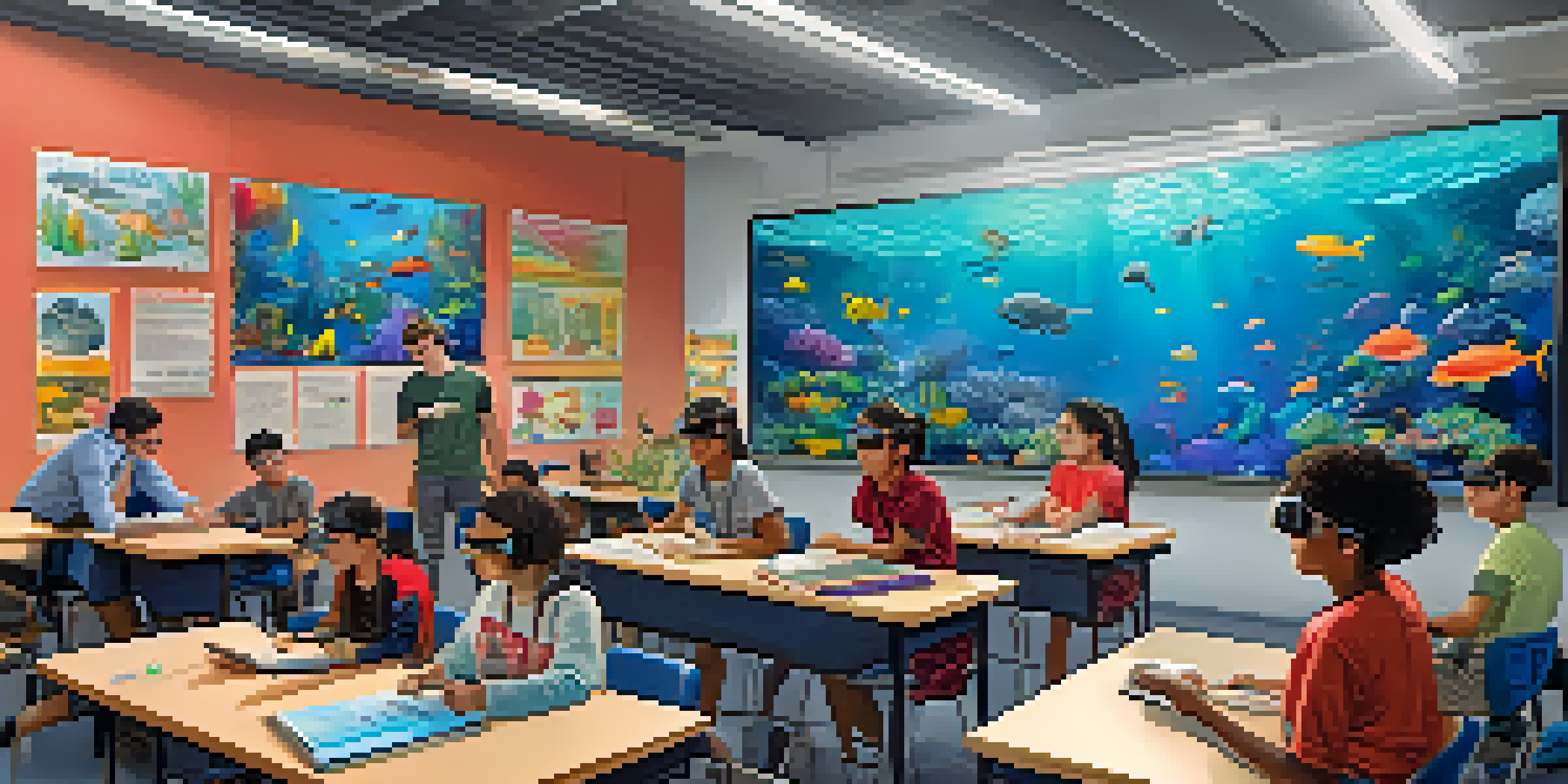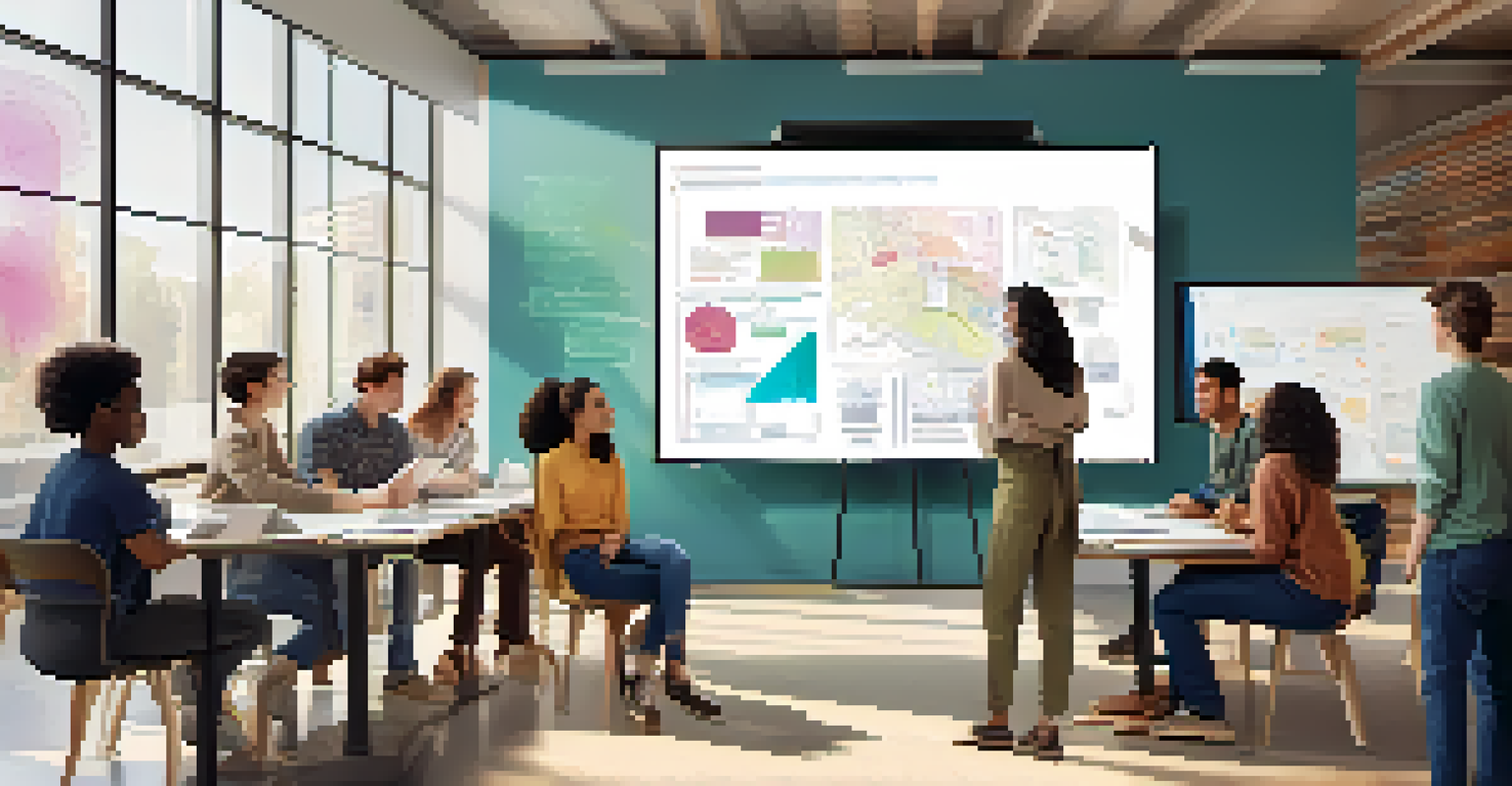The Future of Teaching: Innovations in Digital Education

The Rise of Online Learning Platforms
Online learning platforms have surged in popularity, making education more accessible than ever. With just a few clicks, students can enroll in courses from top universities or explore niche subjects that pique their interest. This shift has opened doors for those who may not have had access to traditional education due to geographical or financial barriers.
Education is not the filling of a pail, but the lighting of a fire.
For instance, platforms like Coursera and edX offer courses from renowned institutions, allowing learners worldwide to gain valuable knowledge. Additionally, many of these platforms provide flexible schedules, catering to working professionals and busy students alike. This flexibility means that education can now fit into anyone's lifestyle, making lifelong learning a reality.
As we look to the future, these platforms are likely to evolve further, incorporating advanced technologies like AI to personalize learning experiences. Imagine a virtual tutor that adapts to your learning pace and style, providing tailored feedback and resources—this is just the beginning of what digital education can offer.
Gamification: Making Learning Fun and Engaging
Gamification in education is revolutionizing how students engage with learning material. By incorporating game-like elements such as points, badges, and leaderboards, educators can motivate students to participate actively in their education. This approach taps into our natural desire for competition and achievement, making learning an enjoyable experience.

For example, platforms like Kahoot! allow teachers to create interactive quizzes where students can compete against their peers. This not only fosters a sense of community but also encourages healthy competition, making the educational process exciting. As students engage more deeply, they are likely to retain information better and develop a love for learning.
Online Learning Expands Access
Online learning platforms have made education more accessible, allowing students worldwide to enroll in courses from esteemed institutions.
Looking ahead, we can expect to see even more sophisticated gamification strategies, including virtual reality experiences and immersive simulations. These innovations will not only enhance engagement but also prepare students for real-world challenges by providing them with practical experiences in a virtual setting.
Artificial Intelligence: Personalizing Learning Paths
Artificial intelligence (AI) is paving the way for personalized education tailored to each student's unique needs. By analyzing data on student performance, AI can identify strengths and weaknesses, allowing educators to customize learning materials accordingly. This targeted approach can significantly enhance the learning experience and improve outcomes.
The future of education is not about technology, but about the people who use it.
For instance, AI-driven platforms like DreamBox Learning adapt in real-time to a student's understanding of math concepts, offering targeted exercises that address specific challenges. This level of personalization ensures that students are neither bored with material that is too easy nor overwhelmed by content that is too difficult.
As AI continues to advance, we can anticipate even more refined algorithms that will create learning paths based on individual preferences and learning styles. This shift will not only empower students but also provide educators with valuable insights to enhance their teaching strategies.
Virtual and Augmented Reality in Classrooms
Virtual reality (VR) and augmented reality (AR) are transforming traditional classrooms into immersive learning environments. By providing students with experiences that go beyond textbooks, these technologies can bring complex concepts to life. Imagine exploring the depths of the ocean or walking through historical sites without leaving your classroom—this is the power of VR and AR.
For example, Google Expeditions allows students to take virtual field trips to destinations around the globe, enhancing their understanding of geography and history. This hands-on approach not only captivates students' attention but also fosters deeper connections with the material being studied.
AI Personalizes Learning Experiences
Artificial intelligence is transforming education by tailoring learning paths to individual students' strengths and weaknesses.
As technology advances, we can expect to see even more innovative applications of VR and AR in education. These tools will not only make learning more engaging but also accommodate various learning styles, ensuring that every student can thrive in this digital landscape.
The Role of Social Learning in Digital Education
Social learning is gaining traction in digital education, emphasizing the importance of collaboration and communication among students. With online forums, group projects, and social media integration, learners can connect with peers from around the world, sharing knowledge and perspectives. This collaborative approach enriches the learning experience and fosters a sense of community.
Platforms like Slack and Discord are increasingly being used in educational settings, allowing students to brainstorm ideas and collaborate on projects in real-time. This interaction not only enhances critical thinking skills but also prepares students for the teamwork they will encounter in the workforce.
As we move forward, the integration of social learning will likely become even more pronounced, with educators leveraging technology to create inclusive environments that support diverse voices. This trend underscores the value of collaboration in a globalized world, equipping students with skills they need for future success.
Data-Driven Insights for Educators
The collection and analysis of data in education are becoming increasingly vital for improving teaching strategies and student outcomes. By utilizing data analytics, educators can gain insights into student performance, engagement levels, and learning patterns. This information can guide instructional decisions, ensuring that teaching methods align with students' needs.
For example, learning management systems (LMS) provide valuable analytics that help teachers identify which resources are most effective and where students may be struggling. This data-driven approach allows for timely interventions, ultimately leading to better academic performance.
Gamification Boosts Engagement
Incorporating game-like elements in education motivates students to engage actively and fosters a love for learning.
Looking ahead, the use of big data in education will likely expand, empowering educators to make informed decisions that enhance the overall learning experience. As schools adopt these data-driven strategies, we can expect to see improvements in student engagement and achievement.
The Importance of Digital Literacy
As digital education evolves, so does the need for digital literacy among students. Understanding how to navigate online resources, evaluate information critically, and use technology effectively is essential in today's digital world. Educators are increasingly tasked with teaching these skills alongside traditional curricula to prepare students for future challenges.
For instance, incorporating lessons on digital citizenship can help students understand the ethical implications of their online actions while promoting safe internet practices. This foundational knowledge not only enhances learning but also equips students with the skills necessary for responsible participation in a digital society.

In the future, digital literacy will likely become a core component of education, ensuring that students are not just consumers of information but also informed creators. This focus will empower learners to thrive in an increasingly digital landscape and contribute positively to their communities.
The Future Landscape of Education Technology
The future of education technology is bright, with continuous innovations set to reshape how we teach and learn. As new tools and platforms emerge, educators will have a plethora of options to enhance their teaching methodologies and engage students effectively. This rapid evolution promises to create a more dynamic and inclusive learning environment.
Moreover, the integration of technology in education is not just about tools; it's about reimagining the entire educational ecosystem. Schools will increasingly adopt blended learning models that combine traditional teaching with digital resources, allowing for a more personalized approach to education.
Ultimately, the future of teaching lies in our ability to embrace these innovations and adapt them to meet the needs of diverse learners. By fostering a culture of continuous improvement and open-mindedness, we can ensure that education remains relevant and impactful for generations to come.